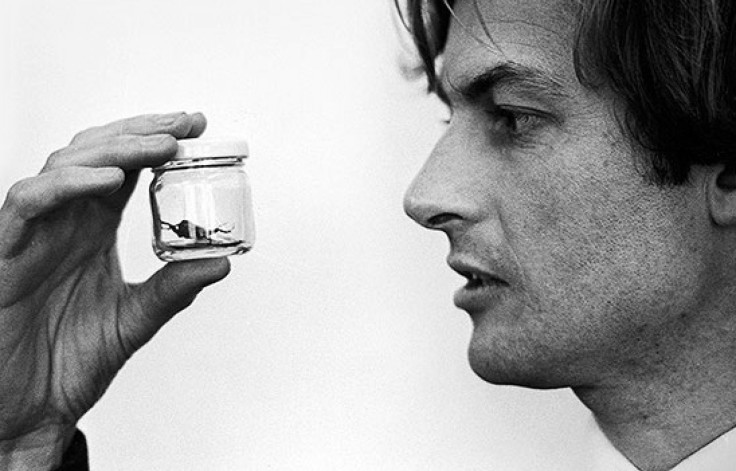Richard Dawkins Memoir Shows Gentler Side Of Outspoken Evolutionary Biologist

Richard Dawkins, often so caustic when sparring with detractors online or onstage, reveals a surprising soft side in his new memoir. “An Appetite for Wonder: The Making of a Scientist” braids eloquently rendered intimate details with the accessible scientific writing that made him famous.
Dawkins also shows some humility in this book, which closes out with a chapter examining some of his own character flaws. He looks back with (perhaps harsher than merited) frustration at his laziness in school, and his own credulous belief in the Happy Hunting Ground, a heaven for pets. Barbs thrown at religious authorities are only occasional. The closest we get to the Dawkins of “A God Delusion” arises when he asks why adults foster credulousness in children:
“Is it really so obviously wrong, when a child believes in Father Christmas, to lead her in a gentle little game of questioning? How many chimneys would he have to reach … ? How fast would his reindeer have to fly in order that he should finish his task by Christmas morning? Don’t tell her point blank that there is no Father Christmas. Just encourage her in the unfaultable habit of skeptical questioning.”
Dawkins is presumably reserving his more stridently secular thunder for the next volume of his autobiography: This installment stops just after the 1976 publication of his seminal work, “A Selfish Gene,” long before Dawkins became one of the foremost faces of atheism. The second volume is slated for publication in 2015.
The first half of this first volume covers Dawkins’s childhood in Africa and England. The chronicle of his years spent in Africa is a pleasant adventure. Dawkins’s parents seem like a real hoot, especially his mother, from whose diaries he extracts some commentary on his early years. In a voice infused with a dash of Laura Ingalls Wilder, Dawkins shares vignettes involving scorpions, lion sightings, playtimes and minor calamities (like the time his family’s house in Malawi was struck by lightning). The England years will be something of a revelation to any American reader whose view of British boarding schools is colored largely by “Harry Potter.”
The second half, starting with his undergraduate years at Oxford, is where his real passion for biology unfurls on the page. Dawkins’ “appetite for wonder” starts to grow ever more ravenous. When assigned to write a paper on the vasculature systems of starfish (which don’t have blood, but instead have a system of vessels to pump sea water):
“For that one week, I remember that I slept, ate and dreamed starfish hydraulics. Tube feet marched behind my eyelids, hydraulic pedicellariae quested and sea water pulsed through my dozing brain.”
Reading the science vignettes in the book -- like a digression on the “bad design” of the nerve that connects to an animal’s voice box, or an analogy drawing a comparison between genetic effects on the body to a bedsheet hanging from a tangled cat’s-cradle of string -- is like wandering into an especially captivating lecture (with no homework assigned).
And Dawkins closes with some poignant reflections on his life, and the random twists of chance that shape our lives. Would he still have written "The Selfish Gene" if he hadn't grown up in Africa? Or if he'd studied biochemistry instead of zoology at Oxford? He suspects that, as with all animals, our lives are neither wholly dictated by chance nor set in stone.
Much of the early coverage of the memoir has been concerned with the revelation that Dawkins was molested by a teacher when he was about 11. His characterization of the incident as “disagreeable,” combined with his statements made to The Times magazine that he would not judge the offending teacher by the standards of today, led to accusations that he was downplaying the horrors of pedophilia. Since then, he’s written a blog post explaining himself a little further:
“Should I have lied and said it was the worst thing that ever happened to me? Should I have mendaciously sought the sympathy due to a victim who had truly been damaged for the rest of his life? Should I have named the offending teacher and called down posthumous disgrace upon his head?
"No, no and no. To have done so would have been to belittle and insult those many people whose lives really were blighted and cursed, perhaps by year-upon-year of abuse by a father or other person who was deeply important in their life.”
This reviewer can only glumly anticipate more controversies and blog posts and counter-blog posts to come with the second volume. That one will probably have more of the present-day Dawkins, who is just as likely to air some inflammatory opinions on Islam as he is to weave a description of genetics. It’s easier to like the Dawkins of “Appetite For Wonder” than the one on Twitter.
“An Appetite For Wonder: The Making Of A Scientist,” by Richard Dawkins, will be available September 24.
© Copyright IBTimes 2024. All rights reserved.











